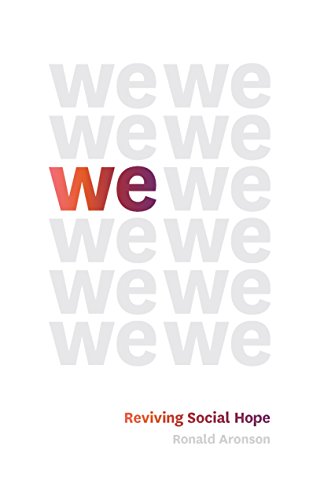The election of Donald Trump has exposed American society’s profound crisis of hope. Ron Aronson’s book We: Reviving Social Hope is a stirring call to social activists.  It is a message to save us from the despair, cynicism and defeatism that paralyzes too many in this troubled time.
It is a message to save us from the despair, cynicism and defeatism that paralyzes too many in this troubled time.
Writing “from the Movement for the Movement,” Aronson argues that social hope is born from collective action, a we, not just I. It is in a movement that “we become members of a larger entity, drawing power from it, having responsibility to it, and experiencing ourselves within it.” Through collective action “the formerly powerless can generate something new, social hope, by acting together.” And this can change not only the world in which we live, we also change ourselves.
He documents these points with several examples: the Occupy movement, the Civil Rights movement, the anti-apartheid movement in South Africa, the 1936-37 Flint sit-down strike and the 1913 Paterson Silk Strike. He also references the enthusiastic waves of movement-centered social hope that spread around the world in 1917-23, 1968, 1989, and 2011. Such episodes keep alive the hope for a better world.
Aronson recognizes that hopes are not always fulfilled. It is necessary that a movement realistically assess it strengths and weaknesses as well as those of its opponent, that it enlist allies by framing its objectives in terms of universal values, that it maintain unity in its ranks … and even then history does not always shine on it. Even with all that, there will be defeats. But as long as there remains injustice, there will be struggle against it.
Social hope comes from collective agency. That leads Aronson to reject industrial, technical, and economic improvements in our lives as the false hope of Progress (with a capital P). These are experienced as the result of “some quasinatural force operating independently of human will” rather than the result of conscious democratic choices. Such Progress happens to us rather than being our own doing. Social hope is that liberation that transforms us into conscious social beings. It is this we-ness of social hope that also makes it more than just an individualistic, private hope.
Aronson’s message comes from reflecting on his own life as an activist and a philosopher. He grew up in Detroit and was educated at Wayne State University, U.C.L.A., the University of Michigan, and Brandeis University, where he earned a Ph.D. in the History of Ideas. Swept up in the political activism of the 1960s, he became a community organizer in the African American neighborhood of New Brunswick, New Jersey, and an editor of the prominent New Left journal, Studies on the Left. He is the author of nine books. Among them is Stay Out of Politics: A Philosopher Views South Africa for which he was awarded the honorary degree of Doctor of Laws by the University of Natal, Durban, South Africa. But his international recognition comes largely from his scholarship on Jean-Paul Sartre.

 It is a message to save us from the despair, cynicism and defeatism that paralyzes too many in this troubled time.
It is a message to save us from the despair, cynicism and defeatism that paralyzes too many in this troubled time.